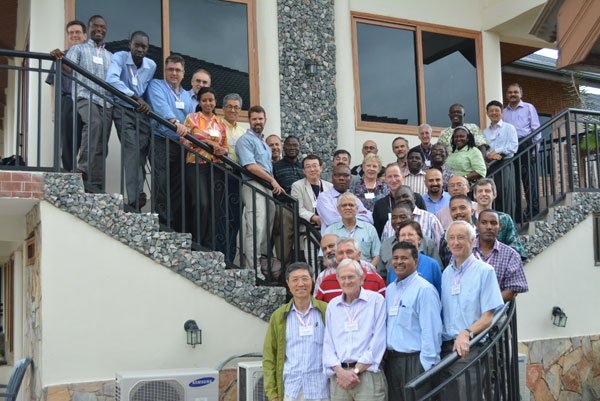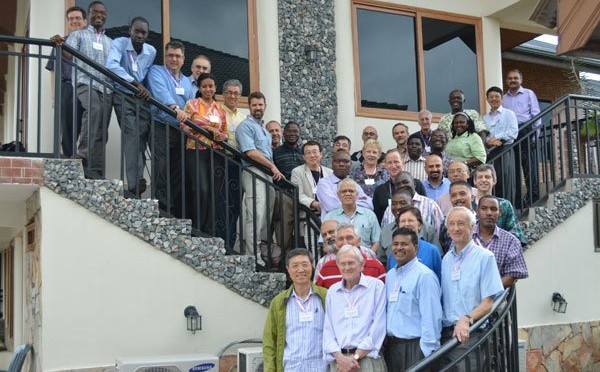Resourcing the Church to Understand Islam and Engage with Muslims

FOR IMMEDIATE RELEASE
Accra, Ghana – 17 April 2014 – Forty scholars and practitioners from twenty countries, representing every continent, gathered 6-12 April in Accra, Ghana, for the Lausanne Global Consultation on Islam. The group included researchers, professors, broadcasters, church leaders, executives of NGOs, and strategic specialists and trainers, all with extensive experience of ministry in Islamic contexts, and several who had come to faith from Muslim backgrounds.
Chaired by John Azumah, Lausanne Senior Associate for Islam, and hosted by Nana Yaw Offei Awuku, Lausanne International Deputy Director for English, Portuguese, and Spanish-speaking Africa (EPSA), the consultation was intended to resource and equip the Majority World church in understanding Islam and engaging with Muslims.
‘For a very long time, Christian witness to Muslims has been a specialized, clericalized, and professionalized task,’ says John Azumah. ‘Mission to Muslims has been left to a number of specialists out of the 2.6 billion members of the global church. Many Christians (lay and ordained) have been largely paralyzed by fear, and in some cases, hatred, inspired mainly by militant Islam. We need to work at de-clericalizing the task and de-escalating the fear and hatred, and inspire the 2.6 billion with the confidence to witness to Muslims and to do so in informed and loving ways.’
Morning devotionals were presented by a Nigerian, an Egyptian, a Filipino, and a native of France working with North Africans. Building on the emphasis of love toward people of other faiths as sounded in section IIC of The Cape Town Commitment, each explored a different dimension of the grace of God that Christians are called to express to their Muslim neighbors.
The first half of the consultation explored five faces of Islam—Mystical and Popular Islam, Missionary and Polemical Islam, Ideological and Political Islam, Militant and Violent Islam, and Progressive and Liberal Islam—with presenters from East Asia, Anglophone Africa, and the Middle East, and respondents from South Asia, Francophone as well as Anglophone Africa, and the South Pacific. Participants continued to explore the implications of these five faces throughout the week and in regional meetings for Africa, Asia, and Middle East/North Africa.
During the second half of the consultation, participants met in four focus groups, exploring needs, opportunities, challenges, and current resources, as well as developing action plans related to training for ministry to Muslims in the context of local churches, seminaries and Bible colleges, mission agencies, and study centers.
A consultation statement, which will serve as a basis for inviting others to network and collaborate in witness to Muslims, with particular focus on identifying and developing resources for churches in the Majority World, is forthcoming. Videos of the presentations will soon be available.
This consultation on Islam is the third in a multi-year series of Lausanne Global Consultations coming out of The Cape Town Commitment (2010), exploring urgent and strategic topics important to world evangelization.
END
RELATED LINKS
- The Cape Town Commitment (Section IIC)
- Lausanne Occasional Paper (LOP) 4 – The Glen Eyrie Report: Muslim Evangelization (1978)
- LOP 13: Christian Witness to Muslims (1980)
- LOP 49: Understanding Muslims (2004)
- Video: John Azumah: Islam Steering Committee (Lausanne Global Leadership Forum, Bangalore 2013)
BACKGROUND
Lausanne is a global movement that mobilizes evangelical leaders to collaborate for world evangelization. It grew out of the 1974 International Congress on World Evangelization convened in Lausanne, Switzerland, by Rev Billy Graham and Bishop Jack Dain. John Stott was chief architect of The Lausanne Covenant. The Third Lausanne Congress on World Evangelization (October 2010) in Cape Town, South Africa, brought together 4,000 Christian leaders representing 198 countries. The resulting Cape Town Commitment serves as the blueprint for the Movement’s activities.
Lausanne is convening several consultations each year around the issues articulated in The Cape Town Commitment. For more information, visit lausanne.org.
CONTACT
For interviews or more information, contact Sarah Chang at media@lausanne.org.
